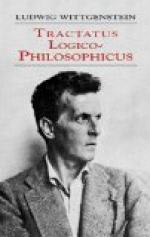5.156 It is in this way that probability is a generalization. It involves a general description of a propositional form. We use probability only in default of certainty—if our knowledge of a fact is not indeed complete, but we do know something about its form. (A proposition may well be an incomplete picture of a certain situation, but it is always a complete picture of something .) A probability proposition is a sort of excerpt from other propositions.
5.2 The structures of propositions stand in internal relations to one another.
5.21 In order to give prominence to these internal relations we can adopt the following mode of expression: we can represent a proposition as the result of an operation that produces it out of other propositions (which are the bases of the operation).
5.22 An operation is the expression of a relation between the structures of its result and of its bases.
5.23 The operation is what has to be done to the one proposition in order to make the other out of it.
5.231 And that will, of course, depend on their formal properties, on the internal similarity of their forms.
5.232 The internal relation by which a series is ordered is equivalent to the operation that produces one term from another.
5.233 Operations cannot make their appearance before the point at which one proposition is generated out of another in a logically meaningful way; i.e. the point at which the logical construction of propositions begins.
5.234 Truth-functions of elementary propositions are results of operations with elementary propositions as bases. (These operations I call truth-operations.)
5.2341 The sense of a truth-function of p is a function of the sense of p. Negation, logical addition, logical multiplication, etc. etc. are operations. (Negation reverses the sense of a proposition.)
5.24 An operation manifests itself in a variable; it shows how we can get from one form of proposition to another. It gives expression to the difference between the forms. (And what the bases of an operation and its result have in common is just the bases themselves.)
5.241 An operation is not the mark of a form, but only of a difference between forms.
5.242 The operation that produces ‘q’ from ‘p’ also produces ‘r’ from ‘q’, and so on. There is only one way of expressing this: ‘p’, ‘q’, ‘r’, etc. have to be variables that give expression in a general way to certain formal relations.
5.25 The occurrence of an operation does not characterize the sense of a proposition. Indeed, no statement is made by an operation, but only by its result, and this depends on the bases of the operation. (Operations and functions must not be confused with each other.)
5.251 A function cannot be its own argument, whereas an operation can take one of its own results as its base.
5.252 It is only in this way that the step from one term of a series of forms to another is possible (from one type to another in the hierarchies of Russell and Whitehead). (Russell and Whitehead did not admit the possibility of such steps, but repeatedly availed themselves of it.)




